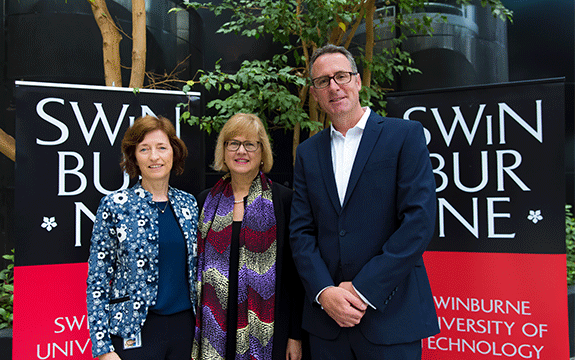Swinburne committed to the elimination of violence against women

In Summary
- On Monday 26 November, Swinburne acknowledged the United Nations’ International Day for the Elimination of Violence against Women
The following is an excerpt from Dr Smith's speech at a staff event observing the UN International Day for the Elimination of Violence against Women. Dr Smith is Vice-President (Students) and oversees the Communications and Media; Marketing, Recruitment and Channel Integration; Student Administration and Library Services; and Student and Academic Services portfolios.
At Swinburne we’re committed to the promotion of a safe, inclusive and caring working environment by taking positive steps to raise awareness about family violence and violence against women more broadly. We’re also committed to contributing to the prevention and elimination of violence against women, as well as enabling our people to provide support to victims and survivors or violence.
The date for the International Day for the Elimination of Violence against Women came from the brutal assassination in 1960 of the three Mirabal sisters, political activists in the Dominican Republic, on orders of the Dictator Rafael Trujillo. The oldest sister, Patria is quoted as saying: "We cannot allow our children to grow up in this corrupt and tyrannical regime. We have to fight against it, and I am willing to give up everything, even my life if necessary.”
In 1999, the UN General Assembly designated 25 November as the International Day for the Elimination of Violence against Women and invited governments, international organisations, and not-for-profit groups to organise activities designed to raise public awareness of the problem. That’s what we’re doing at Swinburne.
The United Nations recognises the pervasive and global issue of domestic violence and acknowledges that violence against women and girls is one of the most widespread, persistent and devastating human rights violations in our world today
Globally, 19% of women between the ages of 15 and 49 say they have experienced physical and/or sexual violence by an intimate partner in the last 12 months.
In Australia, domestic and family violence is a major health and welfare issue that occurs across all ages and sociocnomic and demographics. In our country:
- 58 women have been violently killed by domestic violence this year
- A woman is hospitalised every 90 minutes because of injuries inflicted by either a partner or former partner, a parent, or a child
- Violence against women in an educational setting manifests itself in sexual harassment and sexual assault amongst staff and students, with women as the overwhelming majority of victims and survivors
Violence against women is a workplace issue. It can affect anyone at Swinburne - our students, colleagues, team members, and members of our professional networks.
When an employee is living with domestic and family violence, there are often very real costs and negative impacts that flow to the workplace. The economics costs of domestic violence to the Australian economy is projected to rise to $10 billion by 2021, $250 million of which will be borne by employers.
Swinburne is taking positive steps to raise awareness of violence against women and has put concrete plans in place to prevent and eliminate it. We’re also learning and implementing ways to support victims and survivors. Research also shows that achieving gender equity helps to prevent conflict and reduces rates of violence against women.
In everything we do, Swinburne is committed to providing a safe, caring and inclusive environment for all.
How Swinburne supports staff and students
Swinburne provides a range of support services to students and staff affected by gender-based violence including on-site and online health and wellbeing programs and family and domestic violence employee leave.
Swinburne is also part of the Science in Australia Gender Equity (SAGE) pilot program to improve the promotion and retention of women and gender minorities in STEMM. The university has long been a champion of gender equity and for the past nine consecutive years has been recognised by the Workplace Gender Equality Agency (WGEA) as an Employer of Choice for Women.
MATE Bystander Training Program
Swinburne offers the MATE Bystander Training program to staff and students. This program empowers participants to be better bystanders and leaders in the prevention of gender-based violence. The program teaches participants to recognise problematic behaviour, safely intervene in situations and understand the importance of gender equality and how it is linked to violence against women.

